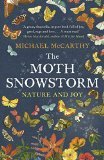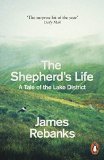Shortlisted for 2016 Wainwright Prize
Five words from the blurb: nature, world, destroyed, beauty, sustainable
I have now read all the books on the 2016 Wainwright Prize shortlist and I certainly saved the best for last. The Moth Snowstorm is a beautifully written book which explains the crisis facing our planet. I like to think I am well informed about environmental issues, but many of the facts were new to me and some were disturbing in their magnitude.
It is extraordinary: we are wrecking the earth, as burglars will sometimes wantonly wreck a house. It is a strange and terrible moment in history. We who ourselves depend upon it utterly are laying waste to the biosphere, the thin, planet-encircling envelope of life, rushing to degrade the atmosphere above and the ocean below and the soil at the centre and everything it supports; grabbing it, ripping it, scattering it, tearing at it, torching it, slashing at it, shitting on it
The Moth Snowstorm begins by explaining how the author fell in love with wildlife – particularly river estuaries. His descriptions were filled with passion and I admired the way he conveyed his joy at being surrounded by the natural world. His interest in wading birds enabled him to discover the crisis effecting estuaries around the world. Many are being destroyed for shipping and leisure purposes, but nobody seems to care much about these muddy flat lands. I was shocked to discover that South Korea recently built a sea wall 21 miles long, destroying the migratory feeding ground for 50 million birds.
The book also highlighted the massive reduction in the population numbers of everything from insects to wildflowers. McCarthy interviewed older people who recalled a time when wildlife was abundant. They described events such drivers stopping to clean their windscreen after driving through a cloud of moths. Sadly numbers have dropped so much that this rarely happens now. I especially liked the way that anecdotes like these were backed up with scientific data. This brought meaning to the tables of statistics, showing what large drops in population mean for our experience of the world.
Details of McCarthy’s private life were also included. These were beautifully written and only added to the emotional impact of the text.
The Moth Snowstorm could easily have become a depressing book, but instead it is a joyful one, encouraging us to appreciate the beauty of the nature around us. It is an inspiring call-to-arms and I hope that increased exposure for this book will raise awareness of the natural catastrophes that are happening globally right now. It deserves to win the 2016 Wainwright Prize and I’ll be keeping my fingers crossed for it when the winner is revealed at Country File Live on Friday.






